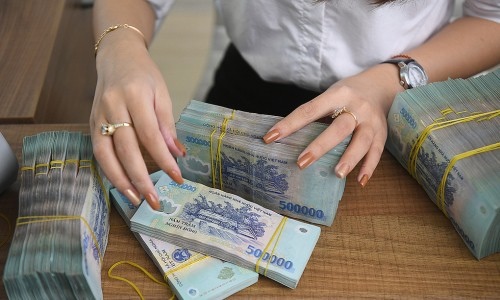According to the Vietnam Real Estate Brokers Association, the experience of other countries shows that credit policy is one of the important tools for governments to regulate the real estate market. Many of the policies that have been successfully applied by other countries can be referenced, learned from, and applied in Vietnam.
Based on the lessons learned from these countries, the Association proposes a number of credit policy solutions to regulate the market when there is a fluctuation of more than 20% in 3 months or when there are other real estate market fluctuations that affect socio-economic stability, without affecting the demand for housing for the people.
 Real estate prices are soaring. |
The Association proposes tightening credit policies for speculators. Specifically, to reduce the number of people borrowing for speculative purposes or using excessive leverage, credit institutions can adjust the lending limit by adjusting the loan-to-value ratio, requiring a higher ratio of payment with their own capital, or applying higher interest rates for second-home buyers and beyond.
Secondly, strengthen credit monitoring and management. According to the Association’s proposal, the government can impose regulations on credit quality control, requiring banks to report in more detail on real estate-related loans, thereby enhancing risk monitoring. Establish a credit mechanism for social housing projects, prioritizing capital allocation for projects developing social housing and affordable housing to meet the housing needs of low-income earners.
In addition, the state also needs to have a credit loosening policy, including reducing interest rates and supporting long-term loans with preferential interest rates for first-time home buyers or other priority subjects for the purpose of social stability such as newly married couples.
To ensure the “right and accurate” application of policies, the Association believes that the state needs to build a large enough, accurate, and up-to-date database system to clearly distinguish between real home buyers and those who use it for production and business purposes, and speculators.
Expediting the publication of real estate transaction price indices and some influencing indicators is essential to determine when the state needs to intervene, especially in the context of rising real estate prices as it is today.
For a more comprehensive regulation of the real estate market, credit policies should be combined with the application of real estate transfer tax or property tax. At the same time, the application of regulatory policies should be noted with flexibility, ensuring the stability of the real estate market order and minimizing risks.
In the last two years, the apartment market in Hanoi has risen rapidly and strongly. The price gap between apartments in Hanoi and Ho Chi Minh City is narrowing (in 2019, the primary price gap between the two markets was 30%; by 2024, the price gap between the two markets fluctuated between 5-7%).
As of the second quarter of 2024, according to surveys and reports from some major provinces and cities such as Hanoi and Ho Chi Minh City, apartment prices increased by an average of 5-6.5% in the quarter and 25% annually, depending on the area and location.
According to the Ministry of Construction, the increase in apartment prices in some major localities such as Hanoi and Ho Chi Minh City is due to the continued limited new supply and the small number of new projects on the market. The scarcity of supply in the middle and lower segments over the past time has contributed to the increase in prices in these projects.
Ngoc Mai





































